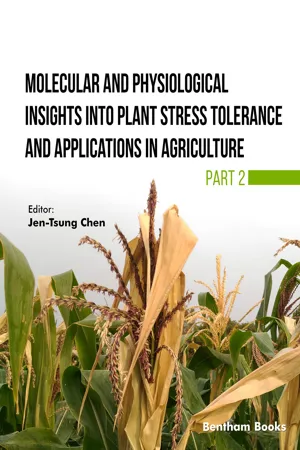
Molecular and Physiological Insights into Plant Stress Tolerance and Applications in Agriculture (Part 2)
- English
- ePUB (mobile friendly)
- Available on iOS & Android
Molecular and Physiological Insights into Plant Stress Tolerance and Applications in Agriculture (Part 2)
About this book
Molecular and Physiological Insights into Plant Stress Tolerance and Applications in Agriculture Part 2 is an edited volume that presents research on plant stress responses at both molecular and physiological levels. This volume builds on the previous volume to provide additional knowledge in studies on the subject. Key Features - Explains aspects of plant genetics central to research such as the role of cytosine methylation and demethylation in plant stress responses, and the importance of epigenetic genetics in regulating plant stress responses. - Explores how Late Embryogenesis Abundant proteins affect plant cellular stress tolerance with an emphasis on their molecular mechanisms and potential implications. - Focuses on beneficial microorganisms including rhizobacteria, endophytes, and mycorrhizal fungi, which are expected to be alternative fertilizers with the advantages of being cost-effective, toxin-free, and eco-friendly. - Highlights the potential use of endophytic bacteria for protecting crops against pathogens - Presents an in-depth analysis of the molecular level to understand the impact of ATP-binding cassette transporters on plant defense mechanisms with a discussion of the potential anti-pathogenic agents based on terpenes and terpenoids. The content of the book is aimed at addressing UN SDG goals 2, 12, and 15 to achieve zero hunger and responsible consumption and production, and to sustainable use of terrestrial ecosystems, respectively. This comprehensive resource is suitable for researchers, students, teachers, agriculturists, and readers in plant science, and allied disciplines. Readership: Researchers, students, teachers, agriculturists, and readers in plant science, and allied disciplines."
Frequently asked questions
- Essential is ideal for learners and professionals who enjoy exploring a wide range of subjects. Access the Essential Library with 800,000+ trusted titles and best-sellers across business, personal growth, and the humanities. Includes unlimited reading time and Standard Read Aloud voice.
- Complete: Perfect for advanced learners and researchers needing full, unrestricted access. Unlock 1.4M+ books across hundreds of subjects, including academic and specialized titles. The Complete Plan also includes advanced features like Premium Read Aloud and Research Assistant.
Please note we cannot support devices running on iOS 13 and Android 7 or earlier. Learn more about using the app.
Information
Table of contents
- Welcome
- Table of Content
- Title
- BENTHAM SCIENCE PUBLISHERS LTD.
- FOREWORD
- PREFACE
- List of Contributors
- Chemical Modifications Influence Genetic Information: The Role of Cytosine (De)Methylation in Plant Stress Responses
- Microbial Dynamics within Rhizosphere: An Aspect to Agricultural Sustainability
- The Role of Terpenoids in Plant Development and Stress Tolerance
- Phytoremediation Potential of Medicinal Plants to Relieve Pollutant Stress
- LEA Proteins in Plant Cellular Stress Tolerance: Insights and Implications
- Insights into Physiological and Molecular Responses of Plants under Metal-Nanoparticle Stresses
- Inoculation of Plant Growth-Promoting Bacteria Aiming to Improve Rice Tolerance to Abiotic Stressful Conditions
- Plant Growth-Promoting Rhizobacteria (PGPR): A Credible Tool for Sustainable Agriculture
- ATP Binding Cassette (ABC) Transporters in Plant Development and Defense
- How can Endophytic Bacteria Benefit Agronomically Important Plants by Protecting Against Pathogens?
- Sustainability of Agriculture and Global Food Supply Using Advanced Molecular Tools and Integrated Multi-omics and Gene Functions